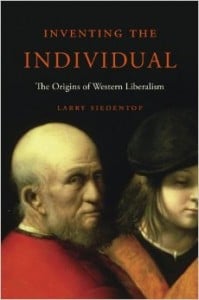Rosman: I remember reading an article in Telos 152 where the author, David Gross, argued that Catholic political thought is a great resource for criticizing contemporary cave projections, because it has always (with the notable exception of the Catholic neocons) set itself against modernity in ways that Protestant political thinking has not. How, if at all, has Catholic political thinking, shaped your own views?
Linker: I sure am glad you included “if at all” as an option. The fact is that distinctively Catholic political thinking hasn’t really influenced me much at all — except at the very deepest level, the level at which it’s influenced every modern liberal. That’s the level of a conviction that every person possesses innate (pre-political) dignity that comes from having been made in the image of God. (If I’m not mistaken, Protestants tend to affirm that as well.) That’s the necessary (but not sufficient) condition of modern liberalism, with its recognition of pre-political individual rights that the state may not transgress. I realize that few contemporary liberal theorists concede the ultimately theological sources of rights-talk, but I think they’re deceiving themselves. It’s probably human nature to feel like a cosmic (intrinsic) wrong has been committed when you suffer an injustice. But the liberal state affirms this feeling at a legal level by saying, “yes, your rights were violated, so we will seek to prosecute the perpetrators on your behalf, even if it was the state itself that violated your rights.” Why does the liberal state do this? Because the people who wrote the Constitution and who have made the laws find such claims of intrinsic, pre-political dignity persuasive. And why is that? Because they’re products of a Christian culture and civilization.

Note, though, that I said “but not sufficient.” Clearly, we need to recognize that it took something like 1,700 years or so for Christian civilization to begin to develop norms and institutions that facilitated the transfer of the church’s theological-anthropological teaching about human dignity over to the political realm. And I’m inclined to give a lot of credit for that to the Protestant innovations that came about in the century or so before liberalism began to develop as a theory of government. So I guess you could say that even at this deep level, Protestantism has shaped my thinking more than Catholic political thought.
At a less fundamental level, I’d also say that I tend not to find Catholic political thinking especially helpful for guiding us through the most fundamental problems of our time. One of those problems is how to conceive of a society that no longer shares a common culture — that’s “centerless,” as I’ve sometimes put it in my writing. Catholic thought always seems to presume that political communities are unified moral wholes. Then when it looks at modern liberal cultures that clearly aren’t unified in this way — their wholeness is highly differentiated into a pluralism of sub-cultures that don’t agree with one another about the highest good — Catholic political thinkers kind of short-circuit. That’s why they’re fond of decline narratives and stories about the Great Fall from medieval Christendom. Brad Gregory’s big book about how all our problems can be laid at the feet of the Protestant Reformation (The Unintended Reformation) is just the latest in a very long line of such accounts. Let’s just say I don’t find arguments like that particularly useful.
The other reason why I tend not to gravitate toward Catholic political thinking is its over-reliance on natural law arguments, which I really dislike. There are at least two reasons why. First, because, to my mind, natural law clearly isn’t what it claims to be — namely, a kind of natural knowledge equally accessible to all human beings through the use of reason with a little help from conscience. If there were such a thing, wow, wouldn’t that be great! There’d be no pluralism, no fractured social-political wholes. But of course we do have such a situation, which means that people don’t have access to obvious first principles in the way that natural law theorists like to presume. What they’re really doing is making a moral-political claim like any other party in our political culture, and the fact is that lots and lots of people reject those claims. So I don’t see where it gets us to pretend that those arguments alone deserve the honorific of being called “natural law.”
Second, law is great. It’s important. So is the idea of the moral absolute. But as all grown-ups are aware, moral judgment ultimately points beyond laws and simple absolutes. Lying is often, even usually, wrong. But we all know that if the Gestapo comes to your door asking about the family of Jews you’re hiding in your basement, the idea of telling the truth is a moral abomination — in that circumstance. Likewise with a conversation that takes place just a few pages into Plato’s Republic: if a friend loans you a weapon and then asks for it back when he’s in a murderous rage, the right thing to do is to violate the “natural laws” against theft and lying by telling your friend that you lost the weapon and keeping it in your possession, even though it’s clearly his property. The idea of an inviolable, absolute “law” can’t take account of this — which is why Aristotle refers, in Book V of the Nicomachean Ethics, to “natural right” instead, and calls it “changeable.” So: I’ll give two cheers for “natural” law. But no more than that, since it’s incapable of guiding us in the really hard cases. It’s very much a moral “Plan B” — and thus one that shouldn’t be fetishized in the way that too many Catholic thinkers do.
Damon opens up about his conversion to Catholicism for the first time in a public interview . . .















